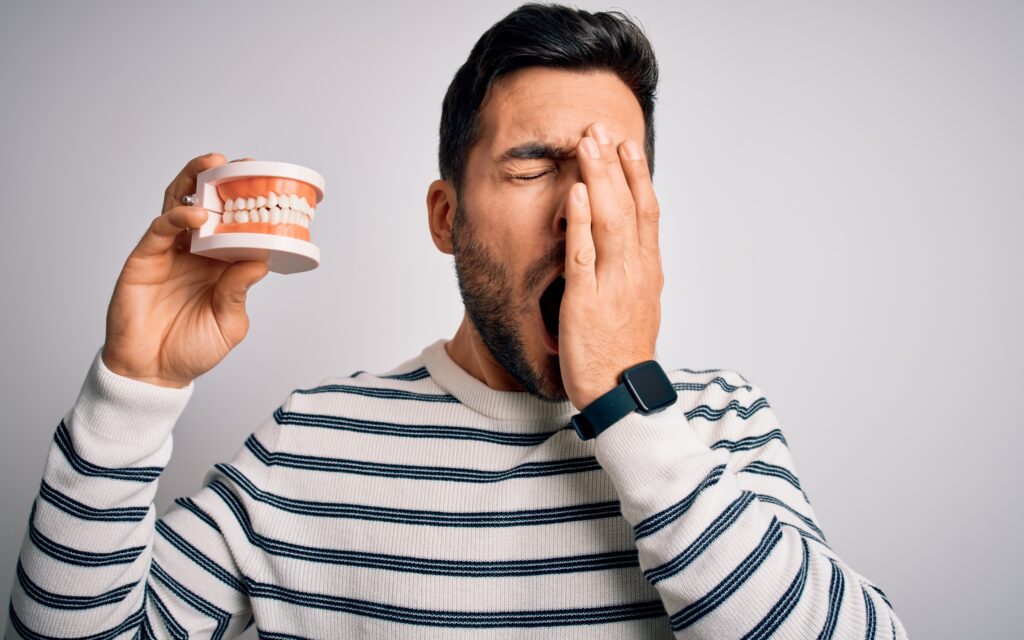Figuring out how to sleep with wisdom tooth pain can seem like an impossible task. When you’re struggling with toothache at night, something as simple as moving your head can raise you from your slumber. So, how do you get a good night’s rest? Read on to get the best advice for toothache at night!
Whether you’re battling an infection or dealing with the pain of wisdom tooth growing into place, maintaining a positive sleep schedule is crucial. Your body uses sleep as a catalyst for healing and growth. Without the right amount of sleep, you may find your wisdom tooth issues only get worse.
Ideally, if you’re experiencing regular tooth pain at night, the first port of call should be your dentist. Many oral health problems require specific treatments, which could involve extractions, antibiotics, or even corrective surgery.
However, if you’re unable to reach your dentist straight away, there are a handful of things you can do in the meantime. In today’s post we’ll try and answer the most common queries about how to sleep with toothache and, especially make you wiser on how to sleep with wisdom tooth pain.
Why is my wisdom tooth pain worse at night?
Some issues with your wisdom tooth, such as an infection or impaction will need treatment immediately from a dentist. Others, like your wisdom tooth growing into place, or there being a small inflammation, are something your dentist won’t be able to help with much.
When you’re dealing with natural growth or recovering from a problem you have already received treatment for, you’ll simply have to wait for the pain to improve.
Before finding potential solutions to your toothache issue, you might ask yourself, “why does my tooth hurt at night?” or “Why does it hurt more at night than it does during the day?”
Unfortunately, searching for “How long does wisdom tooth pain usually last?” online leads to a range of different answers. Some people struggle for a day or two, while others have pain for much longer.
As you wait for your discomfort to dissipate, you may notice your pain is worse at night than it is during the day. There are various reasons for this, such as:
- Blood flow: When laying down, your blood rushes to your head, placing extra pressure on sensitive areas. This can lead to more swelling, and greater sensitivity.
- Fewer distractions: Through the day, you have a million things to keep your mind off your tooth pain. At night, you’re not so easily distracted. Lack of distractions mean you’re focused more on what you feel in the moment.
- Grinding: If you tend to grind your teeth or tense your jaw during your sleep, this will worsen your feelings of tooth pain naturally.
Other things, like brushing your teeth or eating before bed, can flare up a sense of discomfort in the gum surrounding your tooth, which leads to more discomfort.

How should I sleep with tooth pain: Preparing for sleep
The first step in figuring out how to sleep with tooth pain, is preparing yourself for the most comfortable experience possible. Although you might not be able to eliminate pain entirely, there are various steps you can take to reduce your discomfort, such as:
Over the counter medications
Over-the-counter painkillers like ibuprofen and Tylenol are excellent at reducing the swelling common with wisdom tooth pain. If you’ve already received treatment for your tooth, your dentist will have recommended or prescribed some appropriate pain killers.
If you’re still waiting for treatment, you can stick to common over-the-counter medications or ask your pharmacist for help. Make sure any painkillers you take won’t interfere with any other prescriptions you’re using at the moment.
Try clove or garlic
If you’re not sure which prescriptions are safe for you or what kind of painkillers you should be taking, you can consider using a more natural source of pain relief instead. For instance, clove is a common spice used around the world for all kinds of meals. Clove is also rich in a compound called eugenol, which can have numbing effects when applied topically.
Alternatively, if you can stand the strong taste of a fresh clove of garlic, you can try using this natural substance instead. Garlic contains allicin, which is a natural antibacterial substance. If you have an infection in your wisdom tooth, garlic could help to reduce the pain.
Rinse regularly
Rinsing your mouth is one of the best ways to get rid of bacteria. Bacteria could be making your wisdom tooth pain even worse. Most dentists will recommend natural salt water rinses as an excellent way to reduce inflammation and protect teeth from infection.
Alternatively, you could consider using a hydrogen peroxide rinse, which helps to reduce plaque and minimize symptoms of periodontitis. Make sure you dilute food-grade hydrogen peroxide with water when using this method – do not swallow the mixture.
For a more flavorful solution, you could also try swishing peppermint tea around your mouth, as peppermint contains antibacterial compounds, while menthol helps to numb sensitive areas.

How can I stop wisdom tooth pain at night?
Without first seeing a dentist to confirm the cause of your tooth pain, it can be difficult to know what you can safely do to relieve pain. Over-the-counter medications are usually safe but be cautious about what you use.
Some OTC numbing gels and ointments might help to minimize your discomfort, but they won’t be appropriate for all forms of wisdom tooth pain.
Outside of using pain relief recommended by a pharmacist to alleviate your issues, your best option will usually be to make your sleeping environment as comfortable as possible.
Start by:
Elevating your head
Use a high-quality pillow to lift your head as high as possible, while ensuring you still stay comfortable. Lying flat on your back or side can cause blood, and fluids to pool in your head, creating additional pressure and inflammation around your wisdom tooth. Adding more pillows to your sleeping environment can help fluids drain.
Using a cold compress
Don’t apply ice directly to your wisdom tooth, as this can damage the gum. However, you can consider applying a cold compress to your cheek to reduce some of the swelling associated with your pain. Wrap ice packs with cloth before applying them to your cheek. You can also think about sucking on ice chips to cool down the area.
Create additional comfort
When your wisdom tooth is in pain, the least you can do is make sure the rest of your body is as comfortable as possible. Make sure your room is dark and cool and use plenty of cosy blankets to make your bedroom more appealing. Following your natural sleeping routine will help to take your mind off your pain.
Sleep on your side
Sleeping on your side can help you to prop your head up more easily on a pillow compared to sleeping on your back. You can also sleep on the opposite side to your wisdom tooth pain, so you’re not placing extra pressure on that cheek.
Avoid eating too late
Try not to eat too close to bedtime, as this can aggravate your tooth and cause additional discomfort which makes it harder to sleep. When brushing your teeth, try to be as gentle as possible around the uncomfortable area.
Toothache at night: How should I sleep with tooth pain?
If you’re already getting treatment for tooth pain at night, your dentist will be able to give you more personalized advice. They may be able to suggest pain killers you can consider, as well as special night-time routine activities, like rinsing your mouth before bed with a prescription mouthwash.
Even if you do find a way to sleep with tooth pain, don’t simply suffer with the condition by yourself without talking to your dentist.
As much as you might hate going to the dentist, your pain will only get worse if you don’t seek out the correct treatment. You could even risk losing a tooth, if you’re not careful. In the meantime, avoid things which may make your discomfort worse, such as:
- Sleeping flat on your back: Sleeping on your back can cause more pressure around your wisdom tooth. It’s also best to avoid sleeping on the side where you’re experiencing the pain, as this can cause additional pressure too.
- Brushing too harshly: While you may still need to brush your teeth to keep them clean, it’s best to be as cautious as possible when brushing around the uncomfortable area. Try not to scrub too hard, as this can cause lasting pain.
- Drinking or smoking: Alcohol and tobacco can both interfere with your body’s ability to heal. It’s best to avoid these activities when you’re struggling with tooth pain.
Remember, when you do get treatment, follow the directions of your doctor carefully. Your dentist will be able to prescribe additional painkillers to assist with your discomfort when necessary.
Sleeping with tooth pain is almost impossible, but we’ve tried to give some useful advice in today’s post. Hope your pain will leave you very soon.
Siestio. Sleep Matters.
Now read these:
—How to sleep after lipo
—How to sleep in the heat
—How to sleep after booze
Medical disclaimer
You must not rely on the information provided on our website as an alternative to medical advice from your doctor or other healthcare professionals. For more information read our full disclaimer here.







